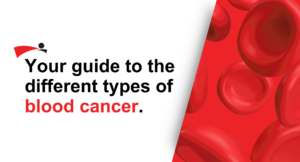Your Guide to the Different Types of Blood Cancer
When you hear someone is diagnosed with blood cancer, you may not realize that there are over 120 types of blood cancer a person can be diagnosed with. At first, the wide variation of blood cancers seems difficult to grasp, but it can be broken down into three main groups: leukemia, lymphoma, and myeloma.
Let’s start from the beginning- blood cancer is described as a cancer which affects a person’s production and function of their blood cells. The two main types of blood cells are red blood cells and white blood cells. Red blood cells are produced in a human’s bone marrow and designed to carry oxygen from the lungs and carry it throughout the body. White blood cells are created in the bone marrow and stored in the lymphatic system. Their main function is to help the body fight off infections.
So, what is the difference between leukemia, lymphoma, and myeloma?
Leukemia
Leukemia is the most common type of Blood Cancer in the United States. Leukemia is the rapid growth of white blood cells in the bone marrow. These white blood cells crowd out healthy blood cells and make it hard for the body to fight off infections.
Lymphoma
The lymphatic system is a crucial part of the human immune system which stores and develops a persons’ infection fighting white blood cells. Lymphoma starts in a person’s lymphatic system and occurs when a white blood cell grows and multiplies rapidly.
Myeloma
Myeloma affects a type of white blood cells called plasma cells. This type of blood cancer is caused when a group of plasma cells form tumors in the bone marrow. These tumors in the bone marrow prevent the reproduction of healthy red blood cells.
Understanding the different types of blood cancer is just a small step in raising awareness around blood cancer. While each type affects the body in unique ways, they all share a common challenge: the need for research, treatments, and support to help those impacted. By learning more and spreading awareness, you can play a crucial role in the fight against blood cancer. Together, we can save lives, provide hope, and help those impacted by blood cancer.

